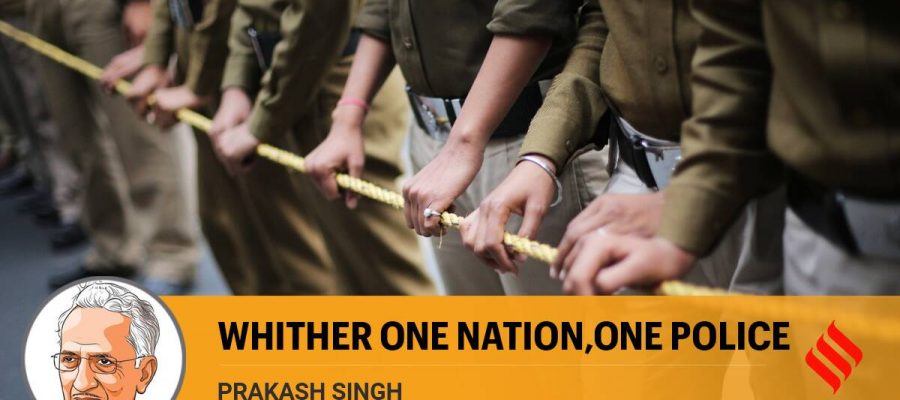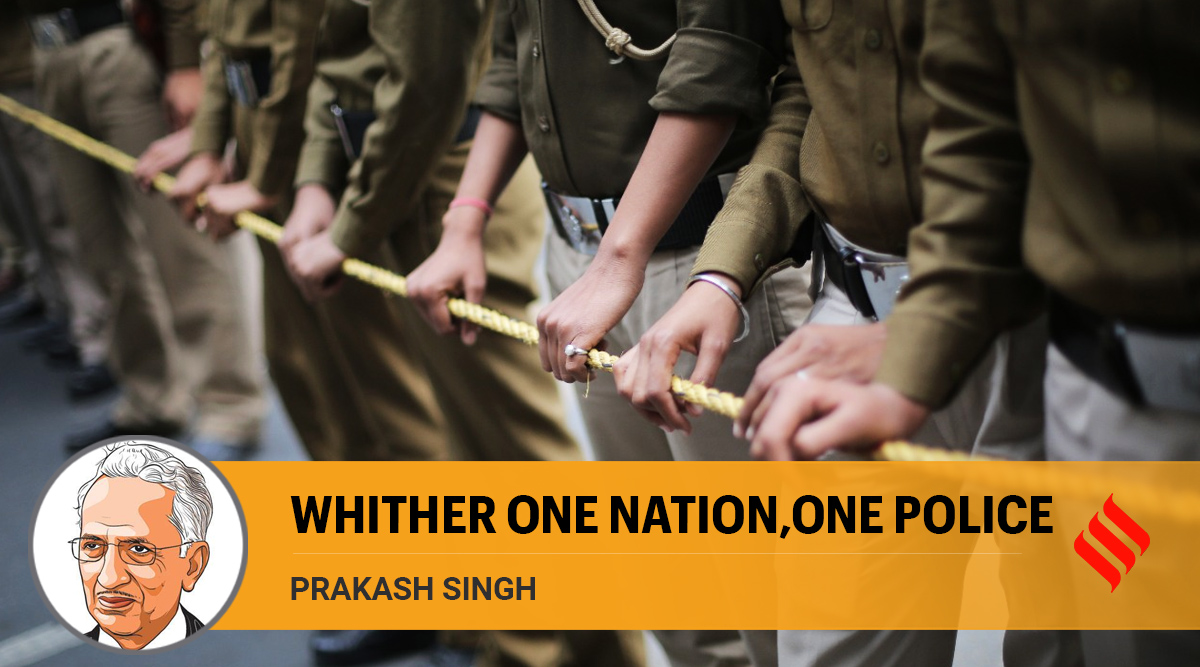Prakash Singh writes: Several state governments have passed Police Acts that are against Supreme Court verdict on police reforms. Centre too has failed to legislate a model Act.
The Government of India has lately been talking of “One Nation, One Ration Card”, “One Nation, One Registry”, “One Nation, One Gas Grid”, and even “One Nation, One Election”. These ideas are laudable and would contribute to an integrated scheme in different facilities and networks across the country. Varying rules for the same facility in different regions of the country can be quite puzzling. The attempt at uniformity should, however, take cognisance of local factors and special features. As long as the regional characteristics are retained and recognised, the same system — in its broad outlines — is welcome.
In police matters, however, we are today confronted with a situation where every state is legislating a different Police Act. These Acts are being passed purportedly in compliance with the Supreme Court’s directions on police reforms given on September 22, 2006. However, an analysis of these Acts shows that the objective behind these laws is to give legislative cover to the existing arrangement and thereby circumvent the implementation of judicial directions. Eighteen states have already passed Police Acts. We are in the process of having “one nation, many police acts”. Why this dichotomy? Why has the Centre been indifferent to having a single Police Act for the entire country?
Soon after the Supreme Court’s directions on police reforms, the Police Act Drafting Committee of the Ministry of Home Affairs headed by Soli Sorabjee, a former Attorney General, came out with the Model Police Act, 2006. The Government of India should have enacted a law based on this Model Police Act with such changes as it may have found necessary, and the states should have mutatis mutandis adopted it. That would have ensured a uniform police structure across the country. That did not happen. The Centre has been dilly-dallying on passing a Model Police Act.
Several states have, in the absence of any central guidance or directive, passed their own Police Acts, blatantly violating the Supreme Court’s directions. Harish Salve filed a contempt petition against these states as the laws enacted “fall foul of the basic minimum requirements to be satisfied by the state in accordance with the constitutional guarantee as interpreted by this Hon’ble Court in the Prakash Singh case.” The petition remains pending. The Supreme Court has, for inexplicable reasons, not issued a contempt notice to any of the states for non-compliance of its directions on police reforms.
Article 252 of the Constitution gives Parliament the power to legislate for two or more states by consent and it lays down that such an Act shall apply to the consenting states and to any other states by which it is adopted through a resolution passed on that behalf by the House or, where there are two Houses, by each of the Houses of the legislature of that state. The least that the Government of India could have done was to legislate for the UTs and then prevailed upon the states where its party was in power to pass similar legislation. That way, we would have achieved some uniformity in 10 to 12 states. Enacting a similar law in the other states could have been incentivised by linking their passage with the modernisation grants made available to the states.
Unfortunately, neither the central leadership nor the state satraps displayed any such intent, let alone showed the required vision. No wonder, the archaic police structure created by the imperial power continues to haunt us and gives us harrowing moments from time to time with police not being able to meet the democratic aspirations of the people.
The Police Act legislated in 1861 applied to almost the whole of India. The colonial government was of the view that the “conditions of police service, machinery and work must be fairly uniform throughout India”. The Police Commission appointed by Lord Curzon in 1902 found that the Act V of 1861was not applicable in the provinces of Madras and Bombay — it, therefore, recommended that the Act be enforced in these provinces as well. In due course, the states passed their own Police Regulations/Manuals, but these were essentially within the framework of the central legislation. It is a galling thought, but the British showed greater vision and far-sightedness in the matter.
Meanwhile, we are hobbling from one crisis to another. In recent times, we saw the unseemly spectacle of the Mumbai police commissioner accusing the state home minister of using the police as an instrument for extortion. In West Bengal, the police have been a mute spectator to Trinamool cadres attacking those who voted against their party. The Centre, through a fiat, gave protection to all the MLAs of the BJP. Normally, any such arrangement should have been in consultation and with the involvement of the state government. The CBI’s arrest of four senior TMC leaders may have been justified, but its timing caused serious misgivings.
In retrospect, it was perhaps a mistake to have copied in the Constitution the distribution of powers between the Centre and the states from the Government of India Act of 1935. However, it would be wrong to blame the founding fathers of the Constitution for that. They could not have foreseen that, over time, policing would become so complex, politics so murky and that Centre-state relations would be under great strain.
What is the way out? The best option would be for the central and state governments to respect each other’s turf in a spirit of cooperative federalism. If that does not happen, it would perhaps be necessary to have a fresh look at the distribution of powers in the seventh schedule of the Constitution.
This column first appeared in the print edition on July 30, 2021 under the title ‘Whither One Nation, One Police’. The writer, a retired Police Chief, has been campaigning for police reforms for more than two decades.
Source: Read Full Article



